- Home
- Linda Newbery
Lucy and the Green Man Page 4
Lucy and the Green Man Read online
Page 4
Things were shaping up better than they’d expected. From time to time, Dave had the odd feeling that jobs were being done before he’d even thought of them: stray pots tidied, soil patted smooth, even the kettle filled ready to be boiled on the camping stove. Next morning, he found all their tools cleaned and polished and hung in their places in the van.
‘Have you been working all night, or what?’ Dave asked Mike, blinking, astonished.
‘Not me, mate! Unless we did all this in our sleep?’
And their woodland garden looked, almost magically, like real woodland, like a forest you could wander into and get lost. The winding path had only been made yesterday, but it looked like years and years of leaf-fall. The trees cast dappled shade; a butterfly settled on silver bark. All the leaves were rain-fresh, though neither Mike nor Dave had heard rain in the night.
‘What a team, eh?’ Mike clapped Dave on the back. ‘We’ve done a great job.’
‘It’s like it made itself,’ said Dave. And they strolled off to the catering tent for a celebratory beer.
Lob set off, exploring.
As he entered the big marquee, someone was watching him. Watching with keenly sharpened interest.
Late May
Lucy was walking home through the park, as she often did, with Trudie, Trudie’s mum, and Trudie’s brother Max in his buggy.
The park was an oasis of green in the city – that’s what Grandpa had said, when he came to visit. There were mossy tree trunks, and branches that spread high. There was a corner where the grass grew long, full of buttercups and cow parsley. A squirrel ran across the grass, stopped, and bushed its tail into a question mark. The park was full of growing, full of lushness and leafiness.
This was a Lob-place if ever there was one.
‘Lob?’ Lucy whispered, for no one to hear.
Instead of going over to the swings with the others, she went to the edge of the trees. She dumped her bag. She picked up stones and dried leaves, bits of twig. Her fingers began shaping them into a pattern – a face, a Lob face. Maybe she could make a spell, a charm, to bring him here?
‘Lob?’ she whispered. ‘Please?’
She shaped eyes and a nose. A mouth.
But she’d looked for Lob so many times, and he was never here. She ought to know by now. He wasn’t coming, was he? He wasn’t coming.
What was the point of pretending? Playing games with herself?
‘Lucy? Come and have a drink,’ called Trudie’s mum, unpacking flasks and biscuits. Max squealed on the swing, clasped tightly by Trudie, who had him on her lap.
‘What you doing, Lucy?’ shouted Trudie.
‘Oh, nothing!’
Trudie knew Lucy’s nothings. She lifted Max down from the swing and went over to see.
Lucy stood up from crouching, and looked at the stones and sticks on the grass, because suddenly that’s all they were. No spell, no magic. Not even really a face. Just a muddly mess of sticks and stones.
She felt herself burning with hurt. She jumped hard into the middle of the face; she kicked and she stamped. She was angry with Lob, with herself, with Trudie – even with Grandpa, for dying. For leaving her.
‘Lucy dancing!’ shouted Max, and he ran to join in.
Lucy trampled and trod. She kicked and scraped until nothing but broken sticks and pebbles showed where the face had been.
Late May
Indoor forest. Scents and fruits, glossy leaves, clambering stems. Flare of bold trumpet flowers.
Cushions of moss, massed and moist. Sandy touch of desert wind, gusts from mountain slopes. Salty whispers of rock island, jungle hoots.
Listen! Smell! Touch!
World in a tent.
Soon drunk on it, drowsed, bemused, bewitched.
Gilbert the vegetable grower had been coming to the Chelsea Flower Show for more years than he could count. This year he thought his display was the best ever – surely his peppers were the reddest, his onions the shiniest and his lettuces the leafiest in the whole marquee.
But it was hard work, these days. His back ached when he stooped to dig, or knelt to thin out seedlings. A helper, that’s what he needed.
So when he glimpsed a small man in the marquee, a flicker of browny-green, something of bark and moss and rain about him, Gilbert looked and looked again. Something stirred in his memory – a whisper, an echo of a story he’d heard as a boy.
A pair of eyes, brightest green, peered back at him from behind a palm tree on the stand opposite.
It was his grandfather who’d told him – and he knew from his grandfather. Way, way back, time out of mind. Lob-lie-by-the-fire! Yes, it was coming back to him, that old, old story. Lob was the helper, the grower, fetcher of firewood.
‘What, is he here for me?’ Gilbert wondered. ‘Oh, wouldn’t that make life a whole lot easier? I’ll go careful, mind. Don’t want to scare him off.’
So, instead of looking back into that curious face, those sharp little eyes, Gilbert busied himself with his stand. He picked up an onion and polished it; he arranged radishes in a dish. From the corner of his eye, he saw Lob watching his every move.
‘He won’t resist,’ he thought, ‘not for long.’
Sure enough, Lob crept closer. Soon he settled himself on the table, between a bunch of celery and a dish of beetroot.
Gilbert smiled. Nice touch, that! Might appeal to the public – those who could see, any rate. Most wouldn’t; Gilbert knew that much. But for those who could, a stand with Lob on it – not a carving, not an ornament, but a real live Lob – would be a bit special! Impress the judges, too, if they had eyes to see.
So Gilbert stood beside his stand, arms folded, grinning broadly. He’d had the feeling his display needed an extra touch. Now here it was.
Just in time for the Royal Visit, too! The Queen always came to Chelsea, for a guided tour before the show opened.
Everyone bustled about, making sure all was ready. Every stand was groomed to perfection – every leaf tweaked, every speck of grit in place. No spilled earth must soil the floor. No snail must be crunched under the royal shoe.
The Great Marquee was quite dazzling. Plants and flowers lined the walls, climbed to the roof, and filled every bit of space with their colour and scent. There were palms and cacti, orchids and eucalyptus, carnations and sweet peas, leeks and parsnips, vines and trumpet lilies.
The TV cameras were ready as a fleet of shining cars pulled up at the main gate. Presidents and vice-presidents greeted the royal party and led them into the marquee.
Gilbert caught his breath. The Queen – yes, really! There she was, in a deep pink coat and hat. Behind her came Prince Charles, and various dukes, duchesses and attendants. A TV cameraman walked backwards, anxious to keep the Queen in view but not fall over his cable. Each gardener stood ready to be introduced, and to answer questions.
Her Royal Highness wouldn’t visit all the stands, of course, so Gilbert was astounded when the procession approached his, and the Queen paused to look.
He stood respectfully to one side.
‘Delightful,’ murmured the Queen; and, ‘so beautifully arranged.’
‘Wonderful to see so many varieties,’ said Prince Charles.
Gilbert felt quite puffed up with pride. Such compliments! The Queen and her followers strolled on to admire the next stand. As they did so, Prince Charles stopped, his eyes widening in surprise. Then he blinked and moved on.
He’d seen Lob! Surely he had.
But when Gilbert looked round to see what Lob was doing, he saw with horror that the neat pyramid of onions was spoiled. There, next to it, sprawled Lob – half a chewed onion in his hand, feet up, shedding earth from his boots. Bits of onion skin were scattered across the stand.
Quickly Gilbert selected a new onion from the box under the table, polished it on his trousers and put it in place; he brushed away the bits. Maybe the Queen hadn’t noticed.
Everyone but Gilbert was still gazing at the royal party. He seized his
moment, and grabbed Lob by one ear.
‘Now then, you! That’s enough!’ he hissed. ‘Scoffing my onions! Messing up my display! Being disrespectful to the Queen! You need shutting up safely, you do!’
Behind his stall was a big hamper, which he used as a seat in quiet moments. He opened it up, dumped Lob in, then closed the lid and sat down hard.
‘I know who you are – don’t go thinking I don’t,’ he snarled. ‘You can stay there till I decide what to do with you.’
From inside the basket, a furious scuffling could be heard by those who could hear. Then silence.
Late May
In Lucy’s dream, Lob was everywhere. He was in the park, in the tiny garden behind the flats, in the trees that bordered the road. He was young, light as a grasshopper, shiny as a beetle, show-offy as a butterfly. In the gusts and showers of late May he darted about, touching a bud here, a leaf there. The candles of the horse chestnuts flared into brightness at his touch.
Lucy looked at it all, smelled and touched and listened, and was dizzy with delight.
Lob was here, and it was the beginning of summer. What could be better?
In the morning, when she woke up, she didn’t even know she’d dreamed. She couldn’t remember any of it. Wide-awake Lucy was pretending she didn’t care any more, and she was starting to believe it.
May–August
When Gilbert the vegetable grower opened his hamper to check that Lob was still inside, he soon regretted it: Lob captured was an angry, writhing, struggling thing. Gilbert slammed the lid very hard.
With teeth-marks on his wrist and scratches on his arms, he thought it safer to keep Lob shut in. He lashed a strong rope around the hamper, and tied it in a triple knot. Two or three times each day, he opened the lid a crack to throw food in – a cabbage, or a bunch of radishes. There was no shortage of fresh vegetables.
When the showground was quiet, at night when all the visitors had gone home, he spoke to Lob in a whisper.
‘I know you. I’ve heard of your sort. Couldn’t believe my eyes when I seen you sat there on the stand, large as life. Would’ve let you stay – nice touch, I thought, make my stand a bit special – only you had to go and spoil it, din’t you?’
There was no answer from the hamper. For a moment Gilbert thought Lob had escaped, but when he bent close and looked through the wicker, he was startled by a bright green eye staring back at him. There was a cold, glittery expression in that eye. Gilbert backed off quickly.
‘Listen here, though,’ he went on. ‘How’d you fancy coming home with me? I could do with a helper, long as you behaves yourself. I’ll give you a nice packing shed to live in. Greenhouse, if you’d rather. Good working conditions. Onions and fresh veg to eat, all year round. Can’t say fairer than that, can I? How about it? Have we got a deal?’
Inside the basket, Lob had gone into a deep huff. He slumped, eyes closed. He didn’t even glance at the vegetables Gilbert threw in.
He waited.
A few days later, the show was over. All the hard work went into reverse – gardens were taken to pieces, trees and plants stowed back in lorries, even the Great Marquee was taken down. All that was left was trodden grass and mud where thousands of people had walked.
Gilbert had sold most of his vegetables, but what remained was packed into the back of his van, and Lob with it.
Chuckling to himself, Gilbert drove through London, heading north-east. He pictured his wife’s surprise when he showed her what he’d got – that’s if she could see.
Back at home, he boasted, ‘I spoke to the Queen! The Queen! And she stopped for a chat with me. Said my stand was the best in the whole show, best by miles. And look what I’ve got here! A new helper. See – only be careful. It bites.’
‘What is it – a dog?’ said his wife, peering into the hamper.
‘Not a dog, a Lob. A Lob-lie-by-the-fire. You know! A helper.’
‘Pfff!’ went his wife, seeing nothing but a few wilted cabbage leaves. ‘Aren’t you a bit old to be playing silly games?’
Gilbert took no notice. He carried the hamper into his packing shed, where he intended to keep Lob shut up. At first, anyway; he didn’t want him straying. Things would sort themselves out. Lob would come round to his way of thinking.
He had a big old run where he had once kept a guard dog, a grumpy Alsatian. It would do for now.
This cage was in the large shed where strawberries and salad crops were brought in crates and boxed up to be sold. Gilbert’s workers did the picking and packing, but none of them saw Lob. At night, Lob was supposed to sort and pack the fruit Gilbert put into his cage.
‘That’s your way, isn’t it?’ Gilbert said. ‘Get on with your jobs when no one sees.’
Lob was NOT going to work for Gilbert. Not a single strawberry would he touch, not a stalk or a pip of one. Gilbert tried coaxing, cajoling, even threatening, but nothing worked.
‘Go on, have your sulk!’ Gilbert told him, getting impatient. ‘You’ll have to come out of it sooner or later.’
Lob didn’t. All he did was fret and pine.
Imprisoned!
Locked in. Caged. Strong bars. Cold hard floor that reeks of dog.
Shut away from the air, from the grass and rain. Snarl and gnaw, scratch and claw. No battering will bend those bars. No terrier could tunnel through that floor.
Won’t work.
Can’t sleep.
Won’t eat.
Can’t rest.
Fade thin as a leaf. Scarcely move. Only half alive.
Days went by. Days and days and days.
Looking into the cage, Gilbert frowned. This wasn’t working. He offered Lob asparagus, spinach and succulent lettuce. Not a leaf or a stalk of it would Lob touch.
Gilbert felt uneasy. Wherever he went, glassy green eyes seemed to drill into him.
One morning, Gilbert unlocked the packing shed and called out, as usual, ‘How are we today, then? Bright-eyed and bushy-tailed?’
Silence, as he expected. But what he didn’t expect was to find Lob sprawled on the cage floor, lifeless as a pile of rags.
‘Oi! Lob-lie-by-the-fire!’ There was a touch of panic in Gilbert’s voice. ‘Lazybones! Stir yourself!’ He nudged Lob with his foot; bent down and poked him. Not a flicker.
‘Blessed if the varmint hasn’t gone and died on me,’ he muttered. He stood for a moment wondering what to do.
No one must know about this; that was for sure. Better bury the useless creature before anyone found it and accused him of starving it to death.
He fetched a shovel, and began digging behind the compost heap. It needn’t be much of a hole, for such a pathetic, shrivelled corpse. Returning to the packing shed, he picked up the raggy thing, bundled it in his arms – how light it was, almost weightless! He couldn’t look at it closely, for fear that those sharp eyes might open and stare back.
It made a dry rustling sound as he dumped it in the hole. He shovelled earth over and stamped it down hard.
Then he tried to forget all about it.
Gilbert didn’t sleep well that night. In his dreams, glittery green eyes jabbed and poked at him.
August
When Lucy heard Mum and Dad talking in their bedroom, she couldn’t help listening. She stood by the door, ears alert. It was eavesdropping, she knew it was, but she couldn’t help it.
It was something Dad said that made her stop to hear more.
‘Have you heard anything about Lob, lately?’
What? They were talking about Lob?
No, they weren’t. They were talking about her.
‘No,’ said Mum, after a pause. ‘Not since she went back to school. She hasn’t mentioned him for a week or two, at least.’
‘Nor to me,’ said Dad.
Was that relief in his voice, or a small sadness?
Now Mum: ‘It’s nothing to worry about if she does! Lots of children have imaginary friends. Sometimes it goes on for years. It’s Lucy’s way of remembering Grandpa, al
l the fun they had together. If it helps her, that’s got to be good.’
‘Mm,’ went Dad. ‘I s’pose you’re right.’
Then they went on to talk about boring things like whether to get a plumber in, for the leaky tap.
Silently, so that they wouldn’t know she’d heard, Lucy tiptoed downstairs. Imaginary friend?
Lob? Is that what Lob was? What he’d been?
If he was imaginary, she thought, then Grandpa must have had a good imagination. Better than most people’s.
Of course. Obvious. She’d gone along with Grandpa’s game of make-believe; she’d pretended, because it made him happy.
She didn’t believe in Lob. Never had done. Not really.
August
It had been hot all day, too hot. It was the kind of heat that rumbles itself up into a storm.
In the night, it rained hard. At first, hot heavy drops spattered down on the dust. Thunder rumbled, far off. Then the rain fell and fell, with a steady hissing sound. The earth sucked it down greedily.
Under the ground, Lob was sleeping the kind of sleep he usually only slept in winter. He was no more dead than a bare oak twig is dead, or a bulb under the ground. Now, as warm rain seeped into him, he began to stir.
Bedded in earth, darkly blanketed. Wake to the wet warmth. Roots tickle, rain trickles. Hands unclench, push up like a mole swims in soil. Scoop away soil, grapple with air. Legs kick, clods fly, feet grip. Head breaks surface …
Breathe, breathe! Breathe the summer night, the drenching rain.
Stand, stretch, stamp. Breathe. Live.
Lob waggled his head, clearing his ears of mud. He emptied out his boots, and put them on again, and wriggled his toes. His ears were alert for any sound from Gilbert’s house, but there was none.
He was free. Ready to walk. The drenching rain made him strong again.
The grave was left as untidy as an unmade bed.
Past the dark house he went to the lane outside, and he stood there in the early dawn, sniffing, sensing his direction.
South. Something was pulling him south. That was the way the road led him.
He walked quickly until he’d put a safe distance between himself and Gilbert’s packing shed. Then he slowed to his usual steady pace, neither hurrying nor dawdling.

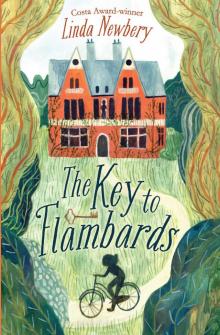 The Key to Flambards
The Key to Flambards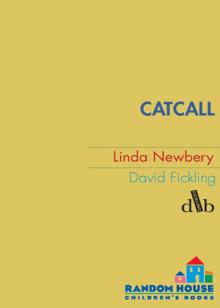 Catcall
Catcall Sisterland
Sisterland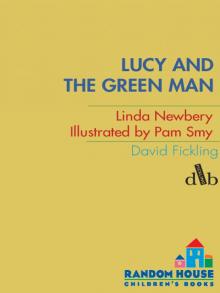 Lucy and the Green Man
Lucy and the Green Man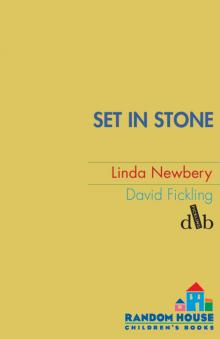 Set In Stone
Set In Stone Lob
Lob Andie's Moon
Andie's Moon The Shell House
The Shell House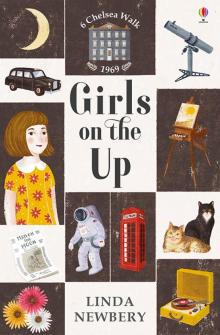 Girls on the Up
Girls on the Up The Sandfather
The Sandfather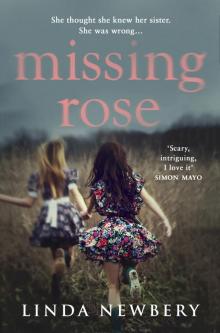 Missing Rose
Missing Rose Polly's March
Polly's March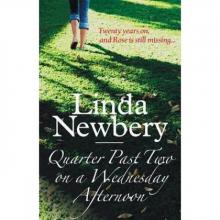 Quarter Past Two on a Wednesday Afternoon
Quarter Past Two on a Wednesday Afternoon Flightsend
Flightsend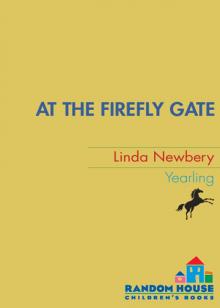 At the Firefly Gate
At the Firefly Gate